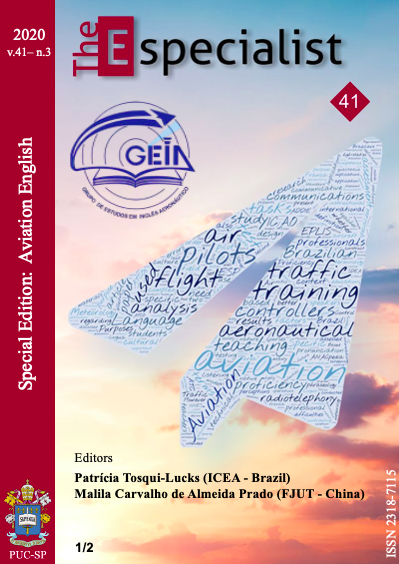Language issues of Brazilian pilots regarding structure: A comparative study between student pilots and SDEA test takers
DOI:
https://doi.org/10.23925/2318-7115.2020v41i3a6Keywords:
Brazilian pilots, Aviation English training, Language testing, Structure errorsAbstract
This article addresses the most common language problems of Brazilian pilots regarding structure, a fundamental skill in aeronautical communications (DOC 9835). We aim to present an overview of the most specific errors made by student-pilots and Santos Dumont English Assessment (SDEA) test takers and compare them in order to better understand their language competence. The qualitative analysis will be based on lists which feature data collected from classroom work (student pilots) and SDEA report forms (RFs). The study is intended to provide researchers with more tools to deal with Aviation English focusing on pilot performance, as well as to contribute to better curriculum design and improvements in assessment practices.
References
BIESWANGER, M. 2016. Aviation English: Two distinct specialised registers? In: SCHUBERT, C.; C, SANCHEZ-STOCKHAMMER, (Eds.) Variational Text Linguistics: Revisiting Register in English. Berlin: DeGruyter. p. 67-85.
BOROWSKA, A. 2017. Avialinguistics: The study of language for aviation purposes. Peter Lang Edition, Frankfurt am Main.
ESTIVAL, D.; C, FARRIS; B, MOLESWORTH. 2016. Aviation English: A lingua franca for pilots and air traffic controllers. New York: Routledge.
GARCIA, A.C.M. 2015. What do ICAO language proficiency test developers and raters have to say about the ICAO language proficiency requirements 12 years after their publication? A qualitative study exploring experienced professionals’ opinions (Unpublished master’s thesis). Lancaster University, Lancaster, UK.
INTERNATIONAL CIVIL AVIATION ORGANIZATION/ICAO. 2010. Manual on the Implementation of ICAO Language Proficiency Requirements, 2nd ed. (Doc. 9835). Montreal, Canada: Author.
KNOCH, U. 2009. Collaborating with ESP stakeholders in rating scale validation: the case of the ICAO rating scale. Spaan Fellow Working Papers in Second or Foreign Language Assessment 7: 21-46.
MATHEWS, E. 2012. Language Gap: In: Flight Safety Foundation, Aerosafety World, 22-27.
PACHECO, A. 2010. A aquisição de morfemas em inglês como L2: Uma análise dos padrões evolutivos através do BELC (Brazilian English Learner Corpus). PhD Dissertation, UFRGS. Available at <https://lume.ufrgs.br/handle/10183/27960>. Access: 10 jan. 2020.
____________. 2019. Perspectives and Implications of language issues of non-native speakers: a more specialized analysis of ab-initio plots learner language. The Proceedings of the International Civil Aviation English association (2019) Conference. Embry-Riddle Aeronautical University Scholarly Commons, p. 118-138. Available at <https://commons.erau.edu/cgi/viewcontent.cgi?article=1160&context=icaea-workshop>. Access: 10 jan. 2020.
PFEIFFER, A. 2009. Inter-rater reliability in an aviation speaking test. Unpublished Masters dissertation. Lancaster University, Lancaster, UK.
PRADO, M.C.A. 2015. Levantamento de padrões léxico-gramaticais do inglês para aviação: um estudo vetorado pela Linguística de Corpus. [Survey on the lexico-grammatical patterns in aviation English: a study conducted by corpus linguistics]. Master’s Dissertation, Universidade de São Paulo, São Paulo, Brazil. Available at < https://www.teses.usp.br/teses/disponiveis/8/8147/tde-16062015-131340/pt-br.php>. Access: 10 jan 2020.
SALDAÑA, J. 2013. The coding manual for qualitative researchers. 2nd ed. London, UK: Sage.
SANDELOWSKI,M.; C.,VOILS and G., KNAFL. 2009. On Quantitizing. J Mix Methods Res. July 1; 3(3): 208–222. doi:10.1177/1558689809334210.
Downloads
Published
How to Cite
Issue
Section
License
The authors grant the journal all copyrights relating to the published works. The concepts issued in signed articles are the absolute and exclusive responsibility of their authors.


 Esta obra está licenciada com uma Licença
Esta obra está licenciada com uma Licença 